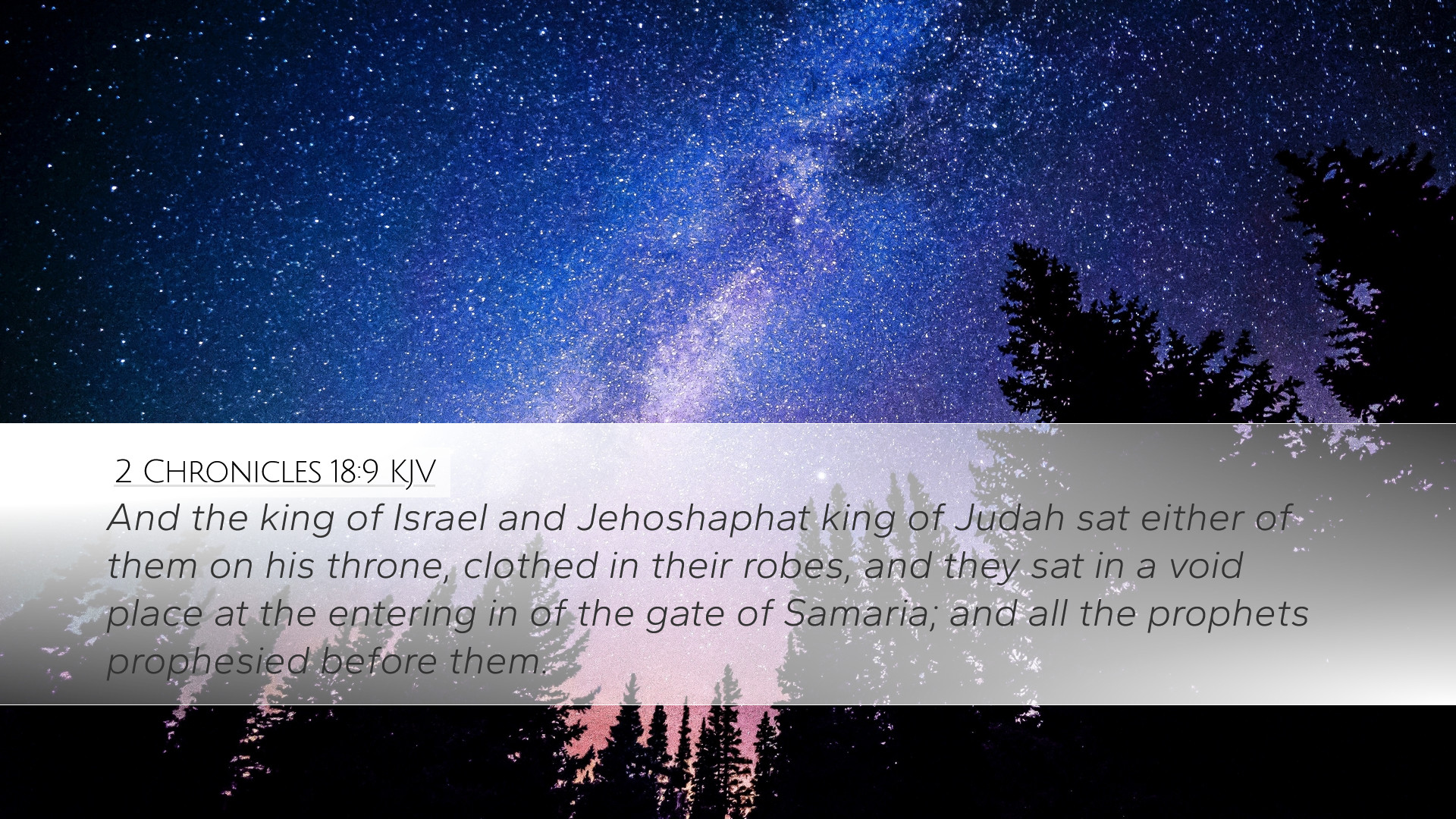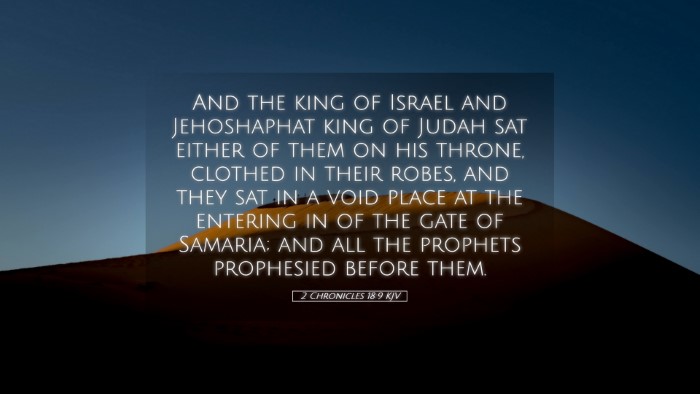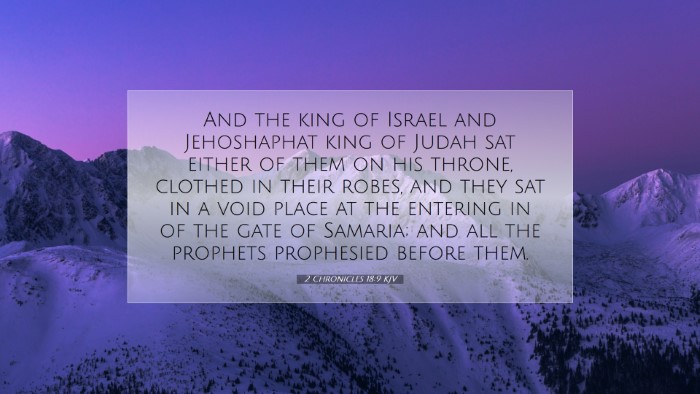Commentary on 2 Chronicles 18:9
2 Chronicles 18:9 states: “And the king of Israel and Jehoshaphat king of Judah sat either of them on his throne, clothed in their robes, and they sat in a void place at the entering in of the gate of Samaria; and all the prophets prophesied before them.” This verse sets the stage for a critical moment in the alliance between the kings of Israel and Judah, highlighting themes of leadership, divine guidance, and the role of prophecy.
Contextual Analysis
This passage occurs during a significant alliance between King Ahab of Israel and King Jehoshaphat of Judah. Their partnership is marked by Jehoshaphat’s visit to Ahab, which encapsulates both diplomatic relationships and spiritual implications.
Historical Background
The context of 2 Chronicles is essential in understanding the leaders’ actions. Ahab, known for his idolatry and opposition to prophetic counsel, embodies a stark contrast with Jehoshaphat, who has sought to return Judah to worship the Lord. The alliance, born of political necessity, raises questions about the intersection of faith and human affairs.
The Symbolism of the Scene
As described in the verse, both kings are seated on thrones and robed in royal attire, symbolizing authority and the responsibilities that accompany such power. Their position at the gate of Samaria, a place of judgment and decision-making, underscores the critical nature of their forthcoming deliberations.
The Role of Prophets
- Prophetic Presence: The gathering of prophets indicates their pivotal role in royal matters, suggesting that they would provide divine insight necessary for governance.
- Clarity of Vision: The presence of the prophets in this setting invites scrutiny into their messages and the motivations behind them.
- Assessment of Authenticity: It becomes crucial for Jehoshaphat, in particular, to discern whether the prophecies being declared align with the true word of God.
Commentary Insights
Matthew Henry’s Commentary
Henry provides a profound observation regarding the nature of the alliance between Ahab and Jehoshaphat. He notes that while Jehoshaphat was a king committed to following the Lord, his decision to ally with Ahab—who was infamous for his contrarian ways—was fraught with spiritual peril. Henry emphasizes that Jehoshaphat should have been cautious, as sharing in Ahab’s court could lead to moral and spiritual compromise.
Albert Barnes’ Exegesis
Barnes reflects on the significance of the prophets present at this pivotal juncture. He discusses how the multitude of prophets likely represented a facade of unity and agreement, while discerning true prophetic voice requires spiritual discernment. Barnes cautions against the dangers of superficial religious observance, underscoring the necessity for true believers to seek authenticity in spiritual matters, particularly where leadership decisions are concerned.
Adam Clarke’s Insights
Clarke emphasizes the strategic aspect of the scene, where traditional practices of seeking prophetic guidance during royal decisions are highlighted. He draws attention to the regional significance of Samaria and the expectation of divine consultation before engaging in military pursuits. Clarke’s commentary also points to the nature of the prophecies that were about to be presented, hinting at the eventual conflict between false declarations and the truth of God.
Theological Implications
The encounter between Jehoshaphat and Ahab is not merely a historical footnote; it is laden with theological implications. The alliance illustrates the struggles of maintaining faithfulness to God's covenant while navigating the complexities of political relationships. Herein lie critical lessons:
- Discernment: The need for leaders to discern the prophetic voices in their midst, ensuring alignment with divine truth as opposed to mere human opportunism.
- Faithfulness vs. Alliances: The delicate balance between maintaining spiritual integrity and the desire for political stability or alliances.
- Consequences of Compromise: The narrative warns of the spiritual and moral dangers inherent in alliances that draw one away from fidelity to God.
Practical Application
For pastors, students, and theologians, this passage invites a reflective examination of leadership and discernment in the modern-day church. Here are key applicative considerations:
- Seek God’s Counsel: Leaders should prioritize seeking God's guidance through prayer and the counsel of true prophets or spiritual mentors.
- Foster Authenticity: The church must cultivate an atmosphere where authentic voices are valued and listened to over popular opinion or convenience.
- Avoid Compromising Alliances: Caution should be exercised in forming partnerships that may draw the church away from its biblical mandate.
Conclusion
2 Chronicles 18:9 captures a moment ripe with significant insight and cautionary tales about leadership and the pursuit of divine wisdom. It transcends its historical context, providing timeless truths important for spiritual governance. As scholars and practitioners reflect on this passage, profound lessons about discernment, authenticity, and the challenges of maintaining faithfulness amid political structures emerge powerfully. This should serve as a call to integrity, wisdom, and steadfastness in all aspects of life and ministry.


